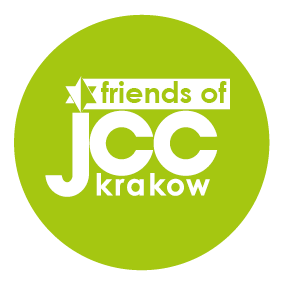Our friend and volunteer, an accomplished Yiddish speaker, Marc interviewed Mundek - an active JCC member and one of the last native Yiddish speakers in Krakow - about his family, his involvement with the JCC, and life before the war. Marc's grandmother, who is from Poland and is a native Yiddish speaker as well, joined us at the JCC for Shabbat dinner a few weeks ago and also spoke with Mundek in Yiddish about their lives before and after the war.
מאַרק שאָרין: ווו איז איר געבוירען געוואָרען?
מונדיק: איך בין געבוירען געוואָרען אין קרוקע, אינעם שטאָט… אין 1931, 2ער אין יאַנואַר.
מש: דאָך ווי האָט איר ייִדיש געלערנט?
מ: דאָס איז אַ וויכטיקער פֿראַגע. איך האָט געוווינט אין אַ קליינער שטעטל [נאָך בין איך געבוירען געוואָרען אין קרוקע]... 23 קילאָמעטער מיזרח פֿון קרוקע. דער שטעטל, הײסט ער נאָווע בזשעסקאָ ["Nowe Brzesko"]. פֿאַר דער חורבן, כ'האָט געהאַט 2 שוועסטערן, און מײַן טאַטע-מאַמע [וואָס האָבן אַסימילירן זיך געהאַט]. זי [די מאַמע] האָט נאָר געקענט פויליש, געדענקט אַלע די צײַטען אין פויליש… ווײסטו, אַז פוילין איז געווען אונטער מאַרשאַל פיוסודסקי ["Piłsudski"] -- [נאָר] נאָך דעם ערשטער וועלטסקריג איז פוילין געווען אָפגעשטאַנען, איז פֿריעס געווען פֿון רוסלאַנד… ס'איז נישט [קײן צו] וויכטיק. [מײַנע עלטערן, מײַן קולטור, זענען זײ געווען ײִדיש, הגם, אַז איז אונדזער אויסינווייניקסטער וועלט פויליש געווען. ס'איז] דאָך, אַז ווען איך האָט 6 יאָרן געהאַט, כ'בין נאָל אַוועקגעשליחט צו אַ חדר. דאָרט איך האָט שנעל ייִדיש געלערנט… ווען איך האָט 7 יאָרן [געהאַט], האָבן די דײַטשן [באַפֿאַלן] פוילין -- זענען זײ געווען די היטלערסדײַטשן, די פֿאַנאַטיקערס, די אַנטיסעמיטס; ס'איז די געניג צו זאָגן, יאָ? זײ זענען געווען קעגן ייִדן. ס'איז געווען אַז ווען זײ זענען געקימען, אַז ייִדישע קינדער [קענען נישט מער] לערן זיך… מיר זענען נישט קײן זייער פֿרימע געווען. מיר האָבן געהאַט אַ געשעפֿט, פוילישע קונים… [און אויך,] די זייער פֿרימע האָבן באָרדס געהאַט. ווען די דײַטשען זענען געקימען, האָבן זײ געשפילט מיט די ײִדן. [ס'איז געווען, למושל,] אַ ייִד מיט אַ באָרד, וואָס האָט געמאַכט אַ "בײנקינג" געשעפֿט אינעם שטאָט, נאָווע בזשעסקאָ. האָבן זײ גענימען אַ פֿריזער צו [גאָלן] דער באָרד. אָבער אײן האָט געזאָגט, אַז ער, דער פֿריזער, איז [אויך] אַ ייִד. [דאָך] האָבן די דײַטשן אָפגעשרײַבן זײַן געלט, און האָבן [דער געלט אויסגעטײלט] צו פוילישע קינדער. אונדזערע צורות איז געווען זײער אַ סך.
Marc Schorin: Where were you born?
Mundek: I was born in Krakow, in the city… in 1931, the 2nd of January.
MS: So how did you come to learn Yiddish?
M: This is an important question. I lived in a small town [after having been born in Krakow]... 23 kilometers west of Krakow. The town is called Nowe Brzesko. Before the Holocaust, I had two sisters and two parents[, both of which had largely assimilated]. She[, my mother,] only knew Polish, [only] read the news in Polish… You know, Poland was under Marshal Piłsudski[‘s control] — [only] after the First World War did Poland become independent, [become] free from Russia… this isn’t [too] important. [My parents, my culture, were Jewish, despite our surroundings being Polish. This is] how it came to pass that at the age of 6, I was sent off to a religious school. There I quickly learned Yiddish… When I [was] 7 years old, the Germans [attacked] Poland — these were the Hitler-Germans, the fanatics, the anti-Semites; it’s enough to leave it at that, no? They were against Jews. When they came, Jews were [no longer] permitted to go to school… We[, meaning my family,] were not very religious. We had a business, Polish customers… [Furthermore,] the very religious [ones] had beards. When the Germans came, they played with the Jews. [There was, for instance,] a Jew with a beard, who ran a bank in town, Nowe Brzesko. They had a barber shave off the beard. But someone said that he, the barber, is [also] a Jew. [So] the Germans confiscated his money, and [redistributed it] among the [town’s] Polish children. We had very many sorrows.

